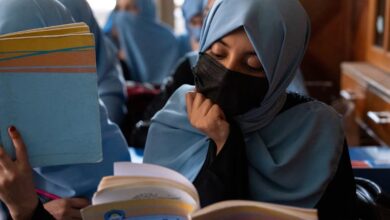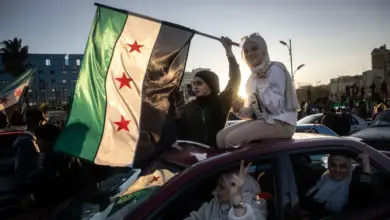International Women’s Day, celebrated on 8 March each year, is a day to honor women and the struggle for women’s rights. Egypt Independent profiles three women leading very different lives, to explore some of the issues facing women in contemporary Egypt.
Fatma’s mounting challenges
Noha Moustafa
Fatma looks much older than her 41 years. Like many women living in the slums lying on the outskirts of Cairo, which have long been neglected and marginalized, Fatma is the sole breadwinner of her family. She is raising four children alone, after her husband, a relative, disappeared from her life after she had borne two girls and a boy. Years ago, her family married her him before she had reached the legal age of marriage.
At such a young age, a divorced single mother of three with absolutely no education, qualifications or anyone ready to help her, she had to take matters into her own hands. She found a cleaning job, one of the only options available for a woman in her dismal situation.
Some years later she remarried, and gave birth to another child. After another divorce, she was left with four to feed, clothe and educate.
Although Fatma has been subjected to all kinds of aggression, leading what many would describe as a truly draining life, Fatma tries not to lose hope, always greeting life and people with a brave face.
“When I remember the days when we hardly had any food in the house, freezing in the winter and totally abandoned by every family member, I know that this too shall pass, with god’s help,” she says.
After Mubarak was ousted two years ago, many thought it would be a turning point for Egyptian women, but Egypt has since seen a regression. The country's new constitution does not protect the rights of women, while street harassment and assault is also rife across the country. Just 2% of MPs elected in 2012 were female, down from 12% in 2010.
And all this translates into Fatma’s life. She is afraid that the ruling Islamists will force women to stay at home and prevent them from work or going out of their homes.
“What would we do then?” she asks rhetorically, hoping that it won’t come to that.
Challenges are mounting for Fatma. As a woman with very limited means, living from hand to mouth, she has been hit by soaring food prices. The daily struggle to put basic staples on the table is intensifying.
“Things are too expensive," says Fatma.
However, she proudly managed to marry her elder daughter, who now has two kids of her own, making Fatma a grandmother, and her second daughter is engaged to be married.
Of her son, studying to be a chef, she says, “I just hope he will find a proper job.”
Karima within the framework
Nevine El Shabrawy
Living in her Maadi apartment, Karima Abdelwahab is reluctant to complain.
“Life has given me much,” she says and perhaps it has. She has food, her children went to good schools and her younger son has the potential to one day become a businessman, if he’ll focus on his studies in college. While her two girls have since married and traveled to live in Dubai and the United States, her son, who has taken his time in university, lives at home.
The two of them live off their inheritance, Karima’s husband died ten years ago.
“I wish I had worked but it’s difficult to start now,” she says. Karima’s degree in nursing would have served her better had she actually gone out and done some nursing, she feels now, but her late husband always encouraged her to stay home with the children and make sure they had a warm and welcoming home.
Karima asserts that it is a constant struggle living without a man in Cairo.
“To buy something in instalments, you need a man to guarantee you,” she explains and with a fixed amount of money that will never grow unless her children add to it, investing her money wisely is always on her mind.
Even the simplest things — a flat tire, a trip to the hospital, workers coming into the house, bargaining — “It’s taken time to learn how to manage without a man, without a support system.”
For Karima, it’s not about being equal to a man but rather she wishes that Egypt was an easier place for a woman who doesn’t have a man. Karima’s father died years ago and she has no uncles or brothers.
“I can’t be the only one trying to live in the city without a man — why would the country make everything so difficult for a single woman?”
Karima worries that if Egypt takes the route of Saudi Arabia, she won’t be able to leave her home without a man.
Karima’s latest issue: a trip to Saudi for Umra. She also has to convince her son to travel with her or else she cannot go.
Safeya’s world
Lina Samir
“I work in a store selling clothing,” says Safeya Habib, 22, a recent graduate from Helwan University with a degree in marketing. Although her family was not supportive of her choice to work, Safeya says it’s her only chance.
“If I depend on a man, he’ll leave me,” she explains, sure of herself. “That’s what happened to my mother.”
Safeya has dreams of having her own clothing line one day and is trying to work her way into the business with her new job.
Every morning she commutes across the city, from Mohandiseen to Heliopolis, to get to work. The store is modern, beautiful and after she arrives, she heads into the dressing room to put on her work clothes, which come from the store. “I can’t wear them in my neighborhood because people would think differently of me,” she says.
Getting the job wasn’t that difficult, she says, but staying there and keeping her respect has been. “The managers and the men working here with me are always looking for a girl they can take advantage of,” says Safeya, “they would say things to me when I would work the shift at night or call me on the phone over the weekend.”
“At first I thought they would take away my job because other girls who work with me told me they would submit,” she says. Safeya took the risk and was not fired —she believes it is because she looks nice. “They think I am a good image for the place, this is what they told me.”
Safeya doesn’t think much about the rights of women in general, but she thinks that to get her own rights, she has to take them.
She is committed to keep going until she is in a managerial position.
Back home, people do not understand where she goes and how she makes money. Because she brings in a salary that helps her mother, she is aware that people think she is up to something unethical. “I always have to come home early enough so it does not appear like I’m doing something immoral.”
Safeya also wants to move to be closer to work but her mother says her life will be even worse if she lives alone.
“So I’m trying to make enough money to move to Heliopolis with my mother,” she says.




